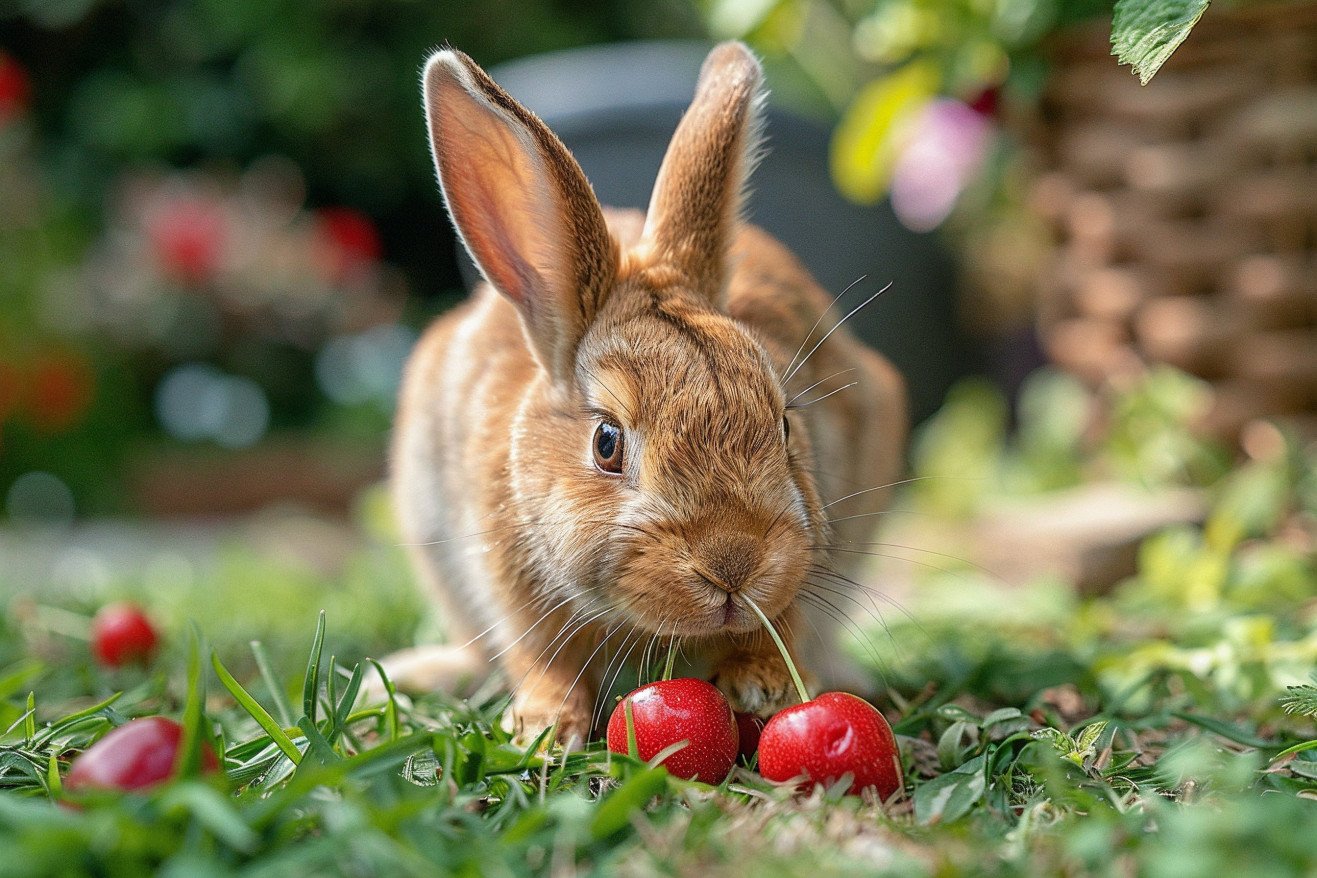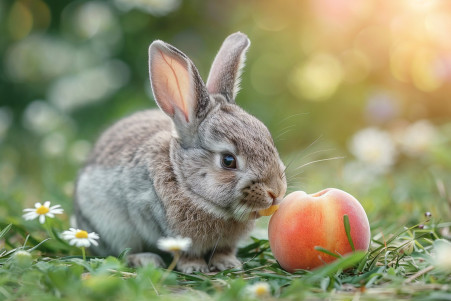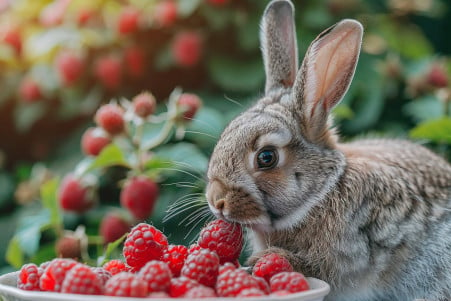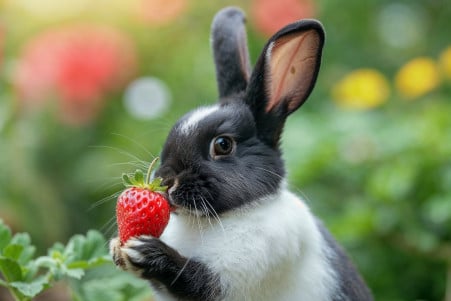Can Rabbits Eat Cherries? Important Feeding Tips
22 February 2024 • Updated 21 February 2024

Cherries are delicious and sweet, but can you share them with your pet rabbit or should you keep them all to yourself? Rabbits can eat cherries as a treat, but only the fruit; the pits and stems are toxic and should be removed. Due to their sugar content, limit a 4-pound rabbit to one cherry twice a week. And, as always, when introducing a new food, do it slowly.
To better understand how cherries fit into a rabbit’s diet, we’ll look at information from veterinarians, nutritional data, and research on rabbit physiology. This will give us a better idea of the potential advantages and disadvantages of feeding cherries to rabbits.
After we’ve gone over the expert recommendations and compared the nutritional content of cherries to other fruits, you’ll have the information you need to decide whether or not to add cherries to your rabbit’s diet.
Can rabbits eat cherries?
A Well-Balanced Diet Is Essential for Rabbit Health
Rabbits need a diet that aligns with their herbivorous nature, which means that they should mainly eat high-fiber hay, grass, and a variety of fresh vegetables to stay healthy.
A study from Oklahoma State University explains that a rabbit’s digestive system is designed to handle plant-based foods, and grass hay is especially important for gastrointestinal motility and digestive health in general.
While it can be easy to give in to treats, rabbit owners need to make sure that they are only a small part of the diet because many of them are high in sugar. While fruits like cherries can be a part of the diet, they should only be given as treats and in moderation. The RSPCA warns that root vegetables and fruits should be fed in moderation because rabbits wouldn’t eat them in the wild.
It’s important to be patient when adding new foods to a rabbit’s diet. Rabbit owners should take at least a week to introduce a new food, watching for any signs of digestive upset, including changes in droppings or soft stool, which can be a sign of more serious problems, according to the RSPCA.
By following these guidelines, rabbit owners can make sure that the treats they give their pets, including cherries, are a fun and safe addition to their diet.
Cherries: Nutritional Value for Rabbits
Rabbits can take advantage of the many vitamins and minerals found in cherries in moderation. According to Healthline, cherries are a good source of fiber, vitamins, and minerals, such as vitamin C, potassium, copper, and manganese, all of which are important for general health and well-being and may be beneficial for rabbits when consumed in small amounts.
Rabbit owners are also right to be worried about the sugar content in cherries. One cup of sweet, raw, pitted cherries has 25 grams of carbohydrates, most of which come from natural sugars. Because rabbits are unable to digest sugars well, the high sugar content in cherries can lead to obesity and other health problems if they’re consumed in excess.
While the fiber in cherries may be good for rabbits’ digestive systems, it’s important to remember that rabbits’ diets should be made up mostly of hay. In addition, cherries contain salicylates, which are natural plant chemicals that can cause allergic reactions and digestive problems in some rabbits.
When compared to other fruits that rabbits can eat, cherries are a fruit that should be given to rabbits with caution because of their sugar content and the potential for allergic reactions.
According to the Cleveland Clinic, while cherries are a good source of antioxidants and other important nutrients, they should be given to rabbits less often than fruits with lower sugar content, such as apples and blueberries, and should always be given in moderation to ensure a balanced diet.
Understanding Rabbit Digestion and the Role of Fruit
Rabbits have a unique digestive system, which includes their cecum and the process of cecotrophy. The cecum is a fermentation vat that helps break down indigestible fibers and produces cecotropes, which are nutrient-dense pellets that rabbits eat to absorb the maximum amount of nutrients, according to Veterinary Clinics: Exotic Animal Practice. This shows the importance of a diet that is high in fiber, which is needed to support the rabbit’s sensitive gut.
Rabbits have a different way of digesting sugars and fiber than many other animals because of their unique digestive system.
This is why it’s important to be careful when feeding rabbits high-sugar fruits like cherries.
Studies of rabbit gastrointestinal physiology have shown that the rabbit’s small intestine has a fast transit time, which means that sugars have less time to be absorbed, which can lead to problems with high sugar intake, such as that from cherries.
Because of the sensitivity of the rabbit’s digestive system, dietary recommendations for rabbits are based on the need for high-fiber, low-sugar diets to prevent gastrointestinal issues. According to Companion Animals, a high-fiber diet is necessary for rabbits to produce cecotropes normally.
Because of this, any dietary changes, including the addition of new fruits, should be made slowly to avoid gastrointestinal upset and to help ensure that the rabbit can adjust to the new food. By taking this approach, you can help ensure that the rabbit’s digestion stays healthy and that their overall health is supported.
Other Fruits to Consider for Your Rabbit’s Diet
In addition to cherries, there are several other fruits that rabbits can eat that will give them a sweet treat and a variety of nutritional benefits. Chewy explains that apples, blueberries, strawberries, and raspberries are all good sources of vitamins and antioxidants, and they all have a lower sugar content than cherries. By feeding these fruits to rabbits in moderation, you can help supplement their diet with extra hydration and nutrients.
If you’re thinking about other fruits to try, Veterinary Partner recommends that you stick to small amounts of fruit because of their high calorie content. For example, you could give a rabbit a slice of apple or a small handful of blueberries once a week. In addition to their lower sugar content, these fruits will still provide the vitamins and hydration that cherries do.
It’s important to make sure that your rabbit has a varied diet that includes a mix of fruits and other foods, and that you don’t overdo it with the fruit.
The key to a rabbit’s fruit consumption is to keep it varied and in moderation so that you don’t upset their digestive system or throw off their diet.
BeChewy recommends that you introduce only one new food at a time in very small amounts and watch for any negative reactions when you try new fruits. This will help ensure that your rabbit can safely try new treats and enjoy a variety of flavors without any negative health effects.
By making sure that you’re feeding your rabbit a mix of high-fiber, low-sugar fruits, you can help make sure that their diet is well-rounded.
Designing a Healthy Diet for Your Rabbit
To mimic a rabbit’s natural diet, focus on a high-fiber, low-sugar diet that takes into account the rabbit’s unique gastrointestinal system. According to a ScienceDirect article, this means a diet that is mostly made up of high-fiber hay, with some leafy greens and a small amount of protein.
One of the most common mistakes rabbit owners make is feeding their pets too many commercial pellets and not enough hay, which can lead to digestive problems.
Because of their high sugar content, treats like cherries should be thought of as treats and not a regular part of a rabbit’s diet. A study in the Journal of Animal Science found that it’s important to maintain a balanced diet, so treats should be fed in moderation and as part of a regular feeding schedule that also includes appropriate foods like hay, leafy greens, and high-fiber vegetables.
A PMC article recommends that rabbit owners work with a vet to get personalized nutritional advice for their pets. By being mindful of what you feed your rabbit and working with a vet, you can make sure your pet gets the nutrition they need to be healthy and happy for years to come.
Final Thoughts: Can Rabbits Eat Cherries?
When it comes to rabbit treats, cherries can be a nice option, but you’ll want to be careful about how you go about feeding them to your pet. We’ve established that while rabbits can eat cherry flesh, the pits and stems are toxic and should be avoided.
We’ve also established that the high sugar content of cherries means that you’ll want to make sure that your rabbit only eats them in moderation to avoid the potential health problems that can come with overeating them.
This is a good reminder to rabbit owners to always introduce new foods like cherries slowly so that you can watch for any signs of digestive issues. It’s also a good reminder to make sure that you’re prioritizing your rabbit’s overall diet by making sure that they’re getting a good balance of hay and fresh vegetables and that treats are the exception, not the rule.
Finding a balance between variety and safety in your rabbit’s diet will help ensure that they’re healthy and happy. If you want to learn more or make your rabbit’s diet even more specific, you may want to read up on rabbit nutrition or talk to a vet to get some personalized advice.
Armed with this information, you can feel confident as you navigate the world of sweet fruits for your rabbit, knowing that you’re always putting their health and happiness first.


